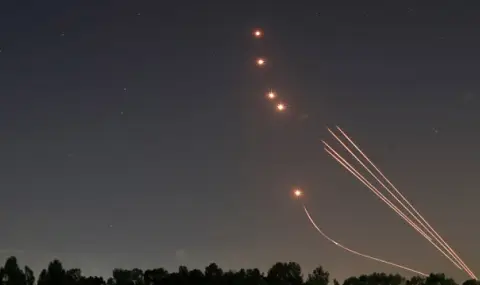Hezbollah is preparing for a long war of attrition in southern Lebanon with a new military command directing rocket fire and the ground conflict, sources familiar with the group's operations told Reuters.
Hezbollah was decimated after three weeks of devastating Israeli strikes and the assassination of its leader, Sayed Hassan Nasrallah. Friends and foes of the group are now closely monitoring how effectively it resists Israeli troops who have crossed into Lebanon with the stated goal of driving it from the border.
The Iran-backed group still has a significant stockpile of weapons, including its most powerful precision missiles, which it has yet to use, despite waves of airstrikes that Israel says have severely depleted its arsenal, four sources familiar with the matter said. with her operations.
Hezbollah's command was disrupted in the first few days after Nasrallah's assassination on September 27 until Shiite fighters set up a new "operations room" 72 hours later, two sources - a Hezbollah field commander and a source close to the group - told Reuters.
Nasrallah was killed, along with other Hezbollah leaders and an Iranian commander, when Israel discovered and bombed his bunker outside Beirut.
The new command center remains operational despite subsequent Israeli attacks, meaning fighters in the south can fire rockets and fight on centrally issued orders, according to the sources, who spoke on condition of anonymity to discuss sensitive matters.
A third source, a senior official close to Hezbollah, said the group is now fighting a war of attrition.
Avraam Levine, an analyst at the Israeli think tank Alma, said it must be assumed that Hezbollah is "well prepared and waiting" Israeli troops and that it is not an easy target.
"The fact that the chain of command is broken does not take away the ability to shoot at Israeli communities or try to hit Israeli forces," Levine told Reuters, describing Hezbollah as "the same powerful terrorist army that everyone we know".
Fighters have the flexibility to carry out orders "according to the capabilities of the front", the Hezbollah field commander said, describing the new command as a "tight circle" in direct contact with the battlefield. It is rare for a Hezbollah field commander to speak to international media.
He said the new command was operating in total secrecy and gave no further details about its communications or structure. Hezbollah has not named a new leader since Nasrallah, and the most likely successor has also been killed. The Shiite group's deputy leader, Sheikh Naim Qassem, said this week that he supported ceasefire efforts but said the group's options were intact.
Another source familiar with Hezbollah operations said the group's dedicated landline telephone network was "essential" for current communications. Sources said the network survived attacks on the group's communications in September.
A statement this week, signed by the "Islamic Resistance Operations Room", said the militants were resisting incursions and were "watching and listening" Israeli troops where they least expect it - apparently a reference to hidden Hezbollah positions. The statement, the first public confirmation of the existence of a new command, did not name its members, nor did it say when or in what context it was created.
Hezbollah's media office did not respond to a request for comment before the publication, which included a detailed summary of the information provided by the field commander and other sources. After this story was published, Hezbollah's media office said in a written statement that the part of the Reuters story "attributed to a Hezbollah field commander is completely false" and that "there are no sources in Hezbollah.
Hezbollah has an extensive network of tunnels in southern Lebanon, both the group and Israel claim. The tunnels grew after the group's 2006 war with Israel, according to a 2021 report by the Alma think tank. Israel estimates that they stretch for hundreds of kilometers.
Hezbollah's field commander said the tunnels "are the bedrock of the battle". Hezbollah has worked for years to build them, he added. "Their time has come," he said.
The Israeli military has released videos it says show deep tunnels taken over by its soldiers. One video posted on October 5 appears to show an underground room equipped with landlines. "Reuters" could not confirm the date or location of the recording.
The source close to Hezbollah said the tunnels discovered by Israel were built so that Hezbollah special forces could one day enter the Galilee region of northern Israel. The source said Israel does not know the full extent of the tunnels.
The US Central Intelligence Agency said Hezbollah possessed more than 150,000 missiles and rockets before the current conflict began.
The two sources said Hezbollah chose not to use its most powerful missiles - including precision-guided missiles - to keep something in reserve for a long war and to avoid a pretext for Israel to expand its strikes on Lebanese infrastructure, such as the airport in Beirut, the roads and bridges.
The third source said the group did not attack Israeli cities such as Tel Aviv with its most powerful weapons because such a move would have given Israel reason to hit Lebanon even harder.
There is no doubt that Israel has inflicted massive damage on Hezbollah. In September, thousands of communications devices used by Hezbollah members were detonated, an attack for which Israel neither confirmed nor denied responsibility.
Beginning on September 23, Israel dramatically escalated airstrikes, claiming to have destroyed tens of thousands of Hezbollah rockets, mostly in southern Lebanon, the Bekaa Valley and the southern suburbs of Beirut.
Israeli officials said the fact that Hezbollah was firing an average of 100-200 missiles and rockets a day, rather than the expected thousands, indicated a significant weakening.
Estimates vary on the extent of Hezbollah's losses, with one Western diplomat saying before Nasrallah's assassination that up to 25 percent of missile capacity had been lost.
